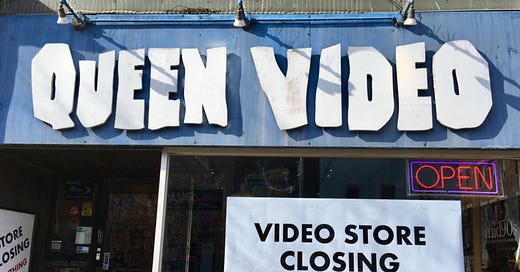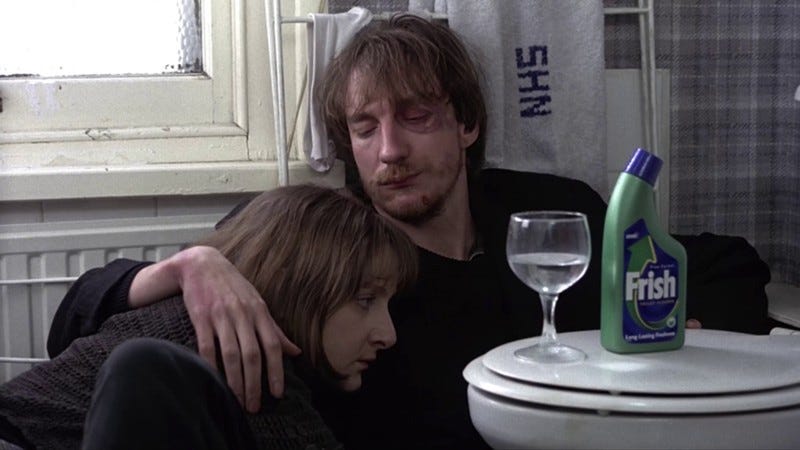An obituary for Queen Video 📼
5 years after its closing, In The Mood contributor Kawai Shen fondly remembers one of Canada's oldest video stores
In Memoriam: Queen Video (1981-2019), or Metaphors for a Beloved Rental Store in a City of Cinephiles
by Kawai Shen

Queen Video’s swan song was like a slow burn ambient track incrementally building in noise and dissonance until reaching a frenzied climax. Cinephiles in Toronto had known for years that the legendary movie rental store’s days were numbered, not only because of its dwindling staff, but because it had already closed its Little Italy outpost on College in 2014, followed by the shuttering of its original Queen West location in 2016. Its last remaining storefront in the Annex neighbourhood had been selling off its back catalogue for at least a year. Yet when Queen announced it was closing its final location and liquidating its remaining inventory, that weight of finality stunned me.
In the chaotic days that followed, bargain hunters mobbed the store, forming a perpetually replenishing queue that snaked straight from the store’s counter, through its front door, and right onto Bloor Street. This drawn-out elegy for one of Canada's oldest rental stores—Queen Video had been in operation for 38 years—was perhaps the kind of track one might hear while browsing its tightly packed displays, every free surface adorned with film posters and cinematic stills cut out from DVD liner notes.
Or perhaps Queen’s slow demise would be more appropriately compared to a Michael Haneke film, the minutes crawling and meandering over treacherous ground toward some inexorable, devastating conclusion. I apologize for leaping from metaphor to metaphor. The mind makes meaning out of metaphor, and in the wake of Queen Video’s demise, I find my mind restlessly searching for something other than Queen Video to capture what Queen Video meant now that Queen Video is gone. For Queen was my neighbourhood watering hole, my film studies lecture hall, my urban safe space sanctuary, my therapist’s chair where I was prescribed movies instead of pills. It was all things in the form of a neighbourhood store; it was my Aleph and Zahir.
In fact, it was a long-time employee and filmmaker named Jacob who had introduced me to Jorge Luis Borges' short stories, The Aleph and The Zahir. But far more than literature, Jacob shared with me his expansive love for cinema. I can still recall our first conversation many years ago, in which we first agreed the heroics of Inglourious Basterds were a pass because the U.S. was totally fine with Hitler until he started invading shit. But I do like watching films about people being wretched, I’d added, to which Jacob procured a copy of Mike Leigh’s Naked, a film that remains among one of my most cherished favourites. It defied all my expectations; among them, how this curious video clerk with the mellifluous voice, angular gait, and shock of gravity-defying anime hair had understood me.
Over the years, I grew to know the other staff and entrusted them as well with my time and attention. My viewing self was in their hands. And they were not there to cater to my preferences. They were not breathing algorithms who would say, “we think you will like this thing, which is so very similar to every other thing you like.” They were human beings with their own ways of seeing and loving cinema. Like Aaron, who had a penchant for dry, abstract, oddball humour; or Lisa, whose taste for cult and horror could rival any discerning sommelier. They were always ready to suggest a movie that had moved them, saying, “I’m not sure if you'll enjoy this but I promise it is amazing.” And sometimes it wouldn’t be something I enjoyed, but always, I would have seen an entirely different kind of amazing I’d never seen before.
I came into Queen Video with a narrow appreciation for cinema that was shocking, mannered, and maximalist. Spurning quieter styles and anything with excessively long takes, I nursed my weakness for the likes of Catherine Breillat, Peter Greenaway, Shinya Tsukamoto. Each time I left Queen, my desire for film exploded a little more. “Have you seen Hard to Be a God? It’s like a new language for cinema,” they said. “You've got to see Ravenous because it’s the best movie about cannibalism,” they advised. “What do you mean you haven’t seen Jeanne Dielman?” To resign yourself to the comfort of your own personal preferences and expectations with something you love, that is the beginning of the decline into obsolescence. It is a classic symptom of existential defeat. In Queen Video, I may have been aging, but I would never grow old. Queen Video was my elixir of life.
Another metaphor then: Queen was a textbook case of Jane Jacobs’ “contacts,” these variegated, unplanned, and enjoyable social interactions that also preserve one's privacy. I once saw staff pull seats from behind the counter for two patrons to continue a lengthy conversation, all the while thinking, maybe cafés during the fin de siècle were like this, where two beautiful strangers would meet and find themselves drawn into a lively discussion. Perhaps these patrons fell for each other; perhaps they never saw each other again.
Like the pornographic theatres of the 1980s that Samuel R. Delany described in his ode to city life, Times Square Red, Times Square Blue, Queen Video was a community space based on pleasure. People of different backgrounds congregated at Queen, all seeking the myriad pleasures of cinema, creating a foment of what Delany would call “interclass contact.” In Queen, your income bracket was irrelevant; your taste in film, paramount. It was here I met all manner of random film aficionados with whom I could discuss and debate (for I was prone to giving strongly-worded, unsolicited advice about what to rent).
And while we began with film, we also filled those walls teeming with DVD covers with all of our other human predilections and interests. It was there I met local filmmakers and artists who stayed to talk shop whereby I learned of underground artist collectives and events about the city; a former Italian fashion designer who loved my Italian moto gloves and spilled tea about the industry; an Indigenous scholar with whom I commiserated about the challenges of writing about race; a messianic East Asian who had probably wandered in from the New Age store on Bathurst and preached to me for half an hour about vibrations; a troubled white gentleman who would shuffle in with disjointed memories of working in the film industry, penned on sheets of lined paper torn out of a notebook, always graciously received by the staff. This spontaneous sharing between strangers of their pleasures and interests and yes, even their disturbances—this is what makes city life. Or, in the midst of renovictions, public transit breakdowns, and climate-change related flooding, this is what makes city life liveable.
A few months before Queen Video’s demise, my spouse bought a Netflix account. Ignoring its AI recommendations, I eagerly began searching its database but came away horrified. I had assumed access to a rich back catalogue given Netflix’s origins as a film rental service. Instead what I found was a smattering of blockbusters in yet another app designed to suck all the time and attention out of its users. One afternoon, we watched three episodes of Peaky Blinders back-to-back with its entertaining pace, its dynamic soundtrack, its tastefully desaturated palette. I felt nauseous, as though I had physically binged, crammed to bursting as I was with plot, character development, and cliff-hangers. I’m not cantankerous about Netflix, but what I do know is this: even if I were to gorge myself daily on Netflix’s ever-replenishing stream of images, it would never understand me.
In its final days, Queen’s staff began rearranging its inventory, taking DVD covers from its back catalogue out of the basement and onto the shelves. Rumours swirled among patrons until just after the spring equinox when Queen replaced its storefront posters of recent releases with a stark black, white and red sign announcing: VIDEO STORE CLOSING *30,000 DVDS TO SELL*. I waited for the lineups to pass before I scooped up copies of the Magick Lantern Cycle, The Misandrists, and The Mirror of the Soul. I brought a package of Girl Scout cookies for the staff. I squared up my late fees. My last rental at the store was Hirokazu Kore-eda’s Shoplifters. It’s really excellent, you should see it.
One last metaphor. Maybe this one will stick. Queen Video was an avatar. It was the god of movies taking flesh and form. For so many of us there worshiped at the altar of cinema. And how we each expressed our love for our phantasmic god gave Queen Video its unique shape. We each drew Queen’s contours beyond its physical boundaries into our homes and our hearts. And in return, we were transported beyond ourselves for a time, transported to all the possibilities of what a loving devotion to cinema in a city like Toronto could be.
But we live in a day and age where everything solid melts into air and nothing is immortal. This is an era when the very gods themselves can weaken, and then die. And so I bid thee good night, sweet Queen. Le cinéma est mort. Vive le cinéma!
Kawai is a writer based in Toronto.
Submissions OPEN for Issue 12 🔮
We’re now accepting submissions for Issue 12: THE FUTURE until January 1st, 2025. Check out our submission guidelines here:
In the mood for something more?
Dive into the juicy archives of our newsletter and our online magazine.
Wondering what to watch?
Choose a mood on our Film Recommendation Generator and get a curated pick from writers, filmmakers, and poets.
Support us!
If you’d like to donate to our mag, here’s our PayPal! We’re volunteer-run, and donations go directly to our contributor honorariums and operating costs.





![Shoplifters – [FILMGRAB] Shoplifters – [FILMGRAB]](https://substackcdn.com/image/fetch/$s_!OoXv!,w_1456,c_limit,f_auto,q_auto:good,fl_progressive:steep/https%3A%2F%2Fsubstack-post-media.s3.amazonaws.com%2Fpublic%2Fimages%2Fd9005985-d2e8-4a09-af1a-ce1b44a10310_1280x692.jpeg)



